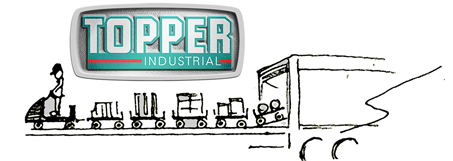Until now, Forktruck Free initiatives, particularly in the automotive sector, have been driven by improved throughput, and not for fear of OSHA fines. Given those fines in the past five years, Ed Brown, Founder of Topper Industrial, and Father of the Forktruck Free Movement thinks there will be a rapid adoption to avoid fines.
According to Brown, “Technology, innovation, new manufacturing practices, and the need for a better and safer way to move material has made or can make fork trucks obsolete in many industries. Sometimes a fork truck is just not the right tool for the job. By analyzing the entire process and evaluating the particular situation we can now find and use the right tool for the job. By doing this we can take the fork truck out of the equation, eliminating the risk and not even worry about OSHA violations anymore.”
Some of the fines reveal why forklifts represent a real liability. The U.S. Department of Labor’s Occupational Safety and Health Administration (OSHA) cited Global Experience Specialists with four, including one willful, alleged safety violations after a worker was injured in a forklift incident at Chicago’s McCormick Place Convention Center. The Las Vegas-based trade show and exposition contractor faces proposed fines of $91,000. An employee from another company working in the convention center severely injured his foot when he was struck by a Global Experience Specialist worker operating a powered industrial truck. After the incident, Global Experience Specialists failed to train or check the certification of the forklift operator.
“Employers, such as Global Experience Specialists, who rely on the use of forklifts in their daily operations, have a responsibility to train their workers in proper operations and to correct deficiencies immediately to prevent hazardous incidents from occurring,” said Gary Anderson, OSHA’s area director in Calumet City. “OSHA is committed to protecting workers on the job, especially when employers fail to do so.” One willful violation was cited for failing to ensure powered industrial truck operators are trained. A willful violation is one committed with intentional, knowing or voluntary disregard for the law’s requirements, or plain indifference to employee safety and health.
Three serious violations were cited for exposing workers to fall hazards during rigging operations and struck by hazards by not ensuring sufficient safe clearance to operate a forklift in aisles, loading docks and through doorways. The employer failed to train forklift operators in site-specific hazards, such as pedestrian traffic areas. A serious violation occurs when there is substantial probability that death or serious physical harm could result from a hazard about which the employer knew or should have known.
Similarly OSHA cited National Pipe and Plastics, Inc., of Vestal, NY for 16 serious violations of workplace health and safety standards after an incident in which a truck driver working for a separate company was fatally struck by a forklift driven by a National Pipe employee. Inspectors found that the forklift had an inoperative backup alarm, and the forklift driver did not have a clear view of the travel path.
“Establishing safety protocols to address foot traffic in these areas would have helped prevent this tragic indecent. National Pipe should have maintained equipment properly, such as the forklift’s backup alarm, and ensured forklift operators maintained focus on their path of direction,” said Chris Adams, OSHA’s area director for Syracuse. OSHA inspectors found additional serious health and safety violations, including failure to maintain surfaces free of combustible dust, maintain fixed stairs at the proper angle, provide handrails on exposed sides of stairways and provide portable metal ladders with slip-resistant rungs.
“One means of preventing accidents and injuries is through an effective safety and health management system where employers and employees work together to evaluate, identify, and eliminate hazards proactively,” said Robert Kulick, OSHA’s regional administrator in New York. The total proposed penalties were $67,000.
Brown concluded that, “Operating a forklift fleet is already an expensive proposition—and injuries on the job or citations from OSHA only compound costs. With the litany of regulations to follow, it is easy to fall behind, and it takes only a few seconds for things to go wrong…sometimes terribly wrong. It makes the proposition for a Forktruck Free environment make more sense moving forward.”

By Thomas R. Cutler, Manufacturing Journalist for Topper Industrial – Material Handling Solutions
Visit Topper Industrial at MODEX 2016. To view video, go to: http://www.modexshow.com/attendees/youroneminute.aspx.

